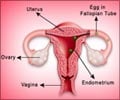While it is thought that men remain fertile throughout life as compared to women, Swedish researchers have now shown that a fertilising sperm can get help from the egg to rejuvenate.
While it is thought that men remain fertile throughout life as compared to women, Swedish researchers have now shown that a fertilising sperm can get help from the egg to rejuvenate.
Researchers at the Sahlgrenska Academy, University of Gothenburg, say that their finding is an important step towards future stem cell therapy.The researchers highlight the fact that the risk of chromosomal abnormalities in the foetus is highly correlated to the age of the mother, but is nearly independent of the age of the father.
According to them, one possible explanation is that egg cells have a unique ability to reset the age of a sperm.
"We are the first to show that egg cells have the ability to rejuvenate other cells, and this is an important result for future stem cell research," says Associate Professor Tomas Simonsson, who leads the research group at the Sahlgrenska Academy that has made this discovery.
The ends of the chromosomes called "telomeres"-which are important for the genetic stability of the cell and they act as a DNA clock that measures the age of the cell-become shorter each time a cell divides, due to which the cell stops dividing and dies.
The researchers say that their finding that the egg cell can extend the telomeres of a fertilising sperm cell attains significance for the development of stem cell therapy, which involves replacing the cell nucleus in unfertilised egg with a nucleus from a somatic cell that has come from a patient who needs a stem cell transplantation.
As soon as the cell has divided a few times, it is possible to harvest stem cells, which are then allowed to mature to the cell type that the recipient needs.
"The genetic stability of the transplanted cells has been a serious concern up until now, and it was feared that the lifetime of these cells would depend on the age of the cell nucleus that was transferred. Our results suggest that this is not the case," says Tomas Simonsson.
Source-ANI
SRM












